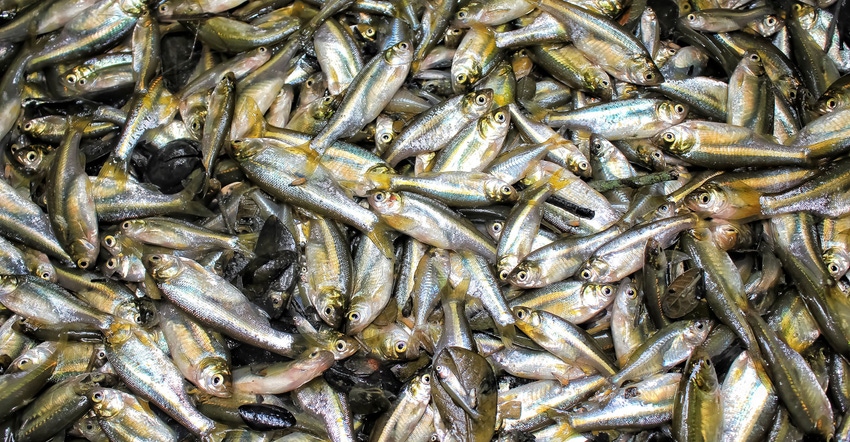
Shakuntala Haraksingh Thilsted, global lead for nutrition and public health at WorldFish, was recently announced the 2021 World Food Prize Laureate for her achievements in pioneering fish-based food systems to improve nutrition, health and livelihoods.
Born in Trinidad and Tobago, Thilsted has spent her career helping develop productive aquaculture practices for small-holder farmers, including pond polyculture systems. She created and helped spread the use of nutritious fish-based foods, such as fish chutney and fish powder — dried fish foods with four times the nutrient density of fresh fish.
She encouraged processing practices that reduce fish waste and increased incomes for the women entrepreneurs making them. Over the years, she's worked with farmers, food processors and consumers to develop aquatic food systems to serve vulnerable populations. She is also the first woman to serve as an officer on the Ministry of Agriculture, Lands and Fisheries in Tobago.
"Dr. Thilsted is the seventh woman to be awarded the World Food Prize and the first woman of Asian heritage," said Barbara Stinson, president of the World Food Prize Foundation, during a press conference earlier this week. "Dr. Thilsted is at the helm of our global progress in the U.N. Decade of Action on Nutrition. She serves in the distinguished roles of champion and vice chair of Action Track 4, 'advancing equitable livelihoods,' of the U.N. Food Systems Summit for 2021. She's guiding the summit's work related to building sustainable and equitable value chains that reduce risks and enable entrepreneurship at all levels."
Aiding fight against hunger
The 2021 laureate announcement included recorded remarks from U.S. Secretary of State Antony Blinken, U.S. Secretary of Agriculture Tom Vilsack and U.N. Nutrition Chair Naoko Yamamoto, with Stinson announcing the name of the laureate.
Blinken noted Thilsted has conducted groundbreaking research in small fish species rich in vital nutrients and minerals, including vitamin A, vitamin B12, iron, zinc and calcium. These are vital for growth and brain development, especially in young children during the first 1,000 days during pregnancy through age 2.
"Dr. Thilsted figured out how these nutrient-rich small fish can be raised locally and inexpensively," Blinken said. "Now, millions of low-income families across many countries, including Bangladesh, Cambodia, India, Nepal, Burma, Zambia, Malawi are eating small fish regularly, dried and fresh, in everything from chutneys to porridges, giving kids and breastfeeding mothers key nutrients that will protect children for a lifetime. That's all thanks to her."
Vilsack noted Thilsted has pioneered more productive and environmentally responsible fish farming methods, helped develop culturally appropriate fish-based foods, and promoted nutrition-focused practices and policies with communities, researchers and government agencies.
"We all know that aquaculture represents an important opportunity to expand the global circular economy through waste utilization with agricultural byproducts and insects fed on agricultural waste, increasingly contributing to high-quality fish feed," Vilsack said. "As our global population grows, we'll need diverse sources of low-emission, high-nutrition foods like aquaculture. It's going to be crucial in feeding the world while reducing our impact on the climate. Dr. Thilsted has been a leader in this effort and is certainly a worthy recipient of the World Food Prize this year."
Yamamoto said Thilsted's research is helping provide healthy, sustainable diets for vulnerable populations.
"Small fish are an accessible and affordable animal source of food that helps to diversify diets and fill nutrient gaps. Sustainability is particularly important. Sustainability requires a comprehensive approach that avoids contaminating water with pesticide residues and microplastics," Yamamoto said. "2021 is a special year for nutrition. We have the midterm of a Decade of Action on Nutrition, the U.N. Food Systems Summit, and the Nutrition for Growth Summit. Dr. Thilsted's work brings crucial research to the summit, and U..N Nutrition is honored to have her as an author of our new discussion paper on aquatic foods in sustainable healthy diets."
Turning point in career
Thilsted said that a turning point in her career came in the late 1980s when she was working at the International Centre for Diarrhoeal Disease Research in Bangladesh. At the time, over 6,000 malnourished children were admitted annually for treatment. Thilsted worked in the nutrition rehabilitation unit, looking into ways to treat and prevent malnutrition in children and their mothers through locally available and acceptable foods.

"I remember mulling over the age-old Bangladesh proverb, 'Mache bhate Bengali,' and that means, fish and rice make Bengali," she said. "I was wondering why fish was placed before the staple food, rice."
So, when Thilsted returned to the University of Copenhagen in Denmark, she began teaching and researching the nutritional value of local fish species.
"And that is when we had our 'aha moment.' These small fish species, for example, Mola from Bangladesh and trey changwa chuhn chuak [silver flying fox] from Cambodia, have very high levels of multiple essential micronutrients," she said.
Working with industry
Over the years, Thilsted has worked with students, researchers, fishery officers, field staff, community leaders and policymakers to promote and increase production and consumption of micronutrient-rich species.
Thilsted also helped develop practices for small-holder farmers, including the pond polyculture system, where small, micronutrient-rich fish species are raised together with larger fish like carp and tilapia.
"At that time, the current practice was to use pesticide to remove all native fish from the pond and then stock the pond with large-sized fish only. We stopped this practice, maintaining the small fish in the pond, and then stocking the pond with both large and small fish," she said. "Our research over the years showed that there were a number of benefits of growing both small-size fish that are rich in micronutrients and large-size fish in pond polyculture. The farmers increased both the quantity as well as the overall nutritional value of the total fish production."
Thilsted and her team also worked with local community partners to create fish-based products like fish chutney, fish powder, complementary foods and snacks, which are particularly suitable for consumption by young children and pregnant women.
This year will be a momentous year for decisive action, Thilsted said — and that's especially true with the upcoming U.N. Food Systems Summit.
"If there is one thing we have learned from the previous year, it's how fragile our food systems are and the crucial challenge we face in radically transforming our food systems for all. In 2021, this challenge is even greater in the face of climate change, locust infestations in Africa, and the path to recovery from the COVID-19 pandemic," Thilsted said. "We now have the opportunity to build forward better. And this way, we can make our food systems more resilient to future shocks."
Read more about:
FisheriesAbout the Author(s)
You May Also Like






